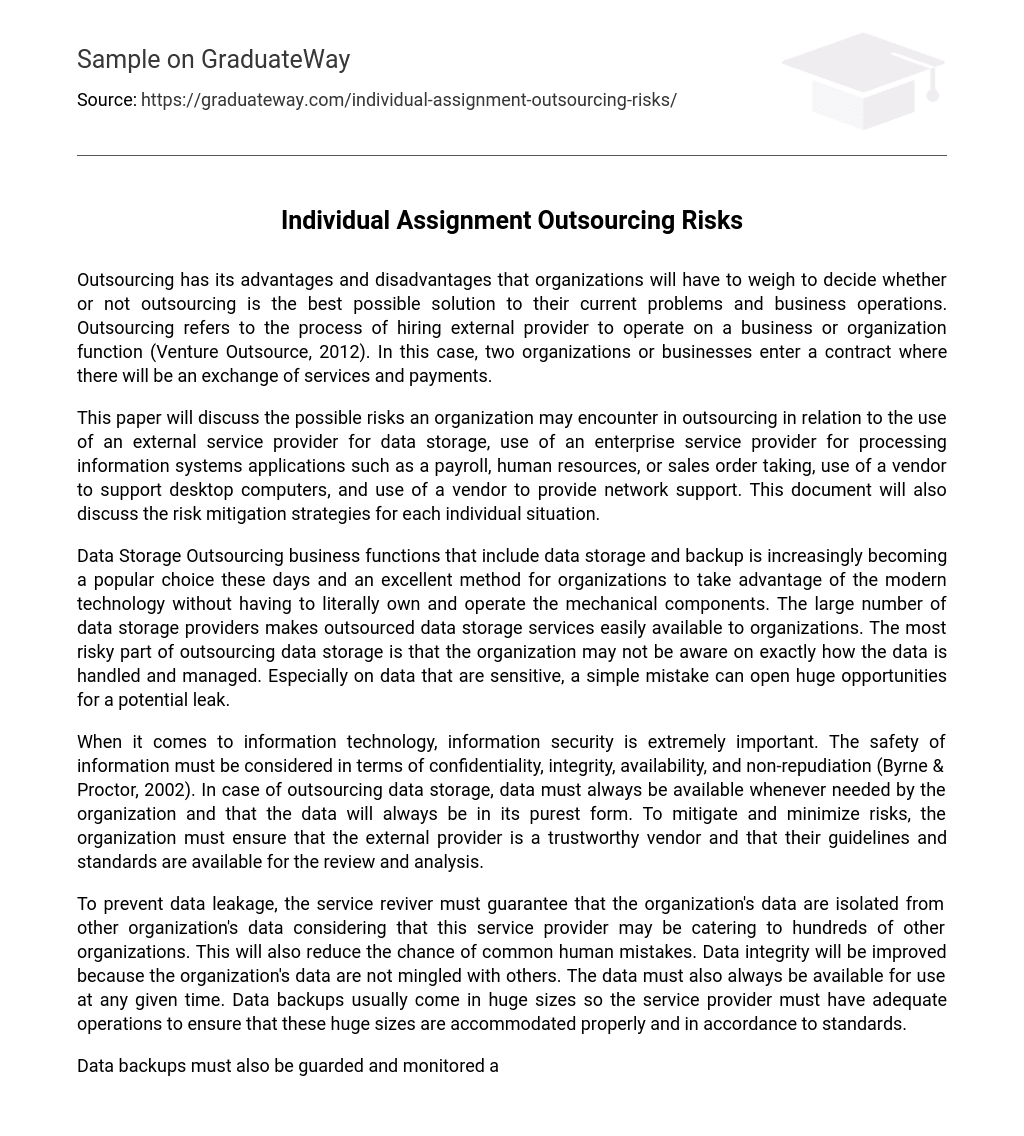Organizations must carefully consider the advantages and disadvantages of outsourcing to determine if it is the most appropriate strategy for their current challenges and business operations. Outsourcing refers to the hiring of an external provider to handle specific functions within a business or organization (Venture Outsource, 2012). This involves establishing a contractual agreement between two entities, with services and payments being exchanged.
The aim of this paper is to address the potential risks that may arise when outsourcing various aspects of an organization’s operations, such as data storage through an external service provider, processing information systems applications through an enterprise service provider (e.g., payroll, human resources, sales order taking), desktop computer support through a vendor, and network support through a vendor. Additionally, this document will examine the strategies for mitigating these risks in each specific scenario.
Data Storage Outsourcing has become a popular option for organizations looking to take advantage of modern technology without the need to physically own and operate the mechanical components. With a large number of data storage providers available, organizations have easy access to outsourced data storage services. However, outsourcing data storage poses a risk, as organizations may not have full knowledge of how their data is handled and managed. This is particularly concerning for sensitive data, as even a small mistake can lead to a significant potential leak.
When it comes to information technology, information security is crucial, considering the aspects of confidentiality, integrity, availability, and non-repudiation (Byrne & Proctor, 2002). When outsourcing data storage, organizations should ensure that data is readily accessible and remains unchanged. To minimize risks, it is essential to select a reliable vendor with accessible guidelines and standards for review and analysis.
To prevent data leakage and reduce the chance of common human mistakes, the service provider must ensure that the organization’s data is isolated from other organizations. This is important because the service provider may cater to numerous organizations. By keeping the organization’s data separate, data integrity will be improved as it will not be mingled with others. Additionally, the data must always be available for use. Given that data backups are typically large in size, the service provider must have proper operations in place to accommodate these backups and adhere to industry standards.
Ensuring the security of data backups requires constant protection and supervision. Many organizations rely on Service Providers to handle non-core functions such as accounting and human resources, allowing them to focus on core operations and improve efficiency. Outsourcing these tasks to specialized third-party vendors can offer even more advantages.
When outsourcing certain functions to external parties, it can pose challenges as they may play a significant role in the company’s operations, even if they are not main business strategies. Consequently, the organization must carefully examine and evaluate potential third-party vendors, particularly in sensitive areas such as accounting and regulated tasks like tax services, to guarantee adherence to government rules and regulations. Computer Support
Computer support is vital for organizations that depend on computers, as employees may lack extensive computer skills. Hence, it is crucial for organizations to offer support for both their employees and any computer-related problems they encounter. Outsourcing computer support provides various benefits, such as reducing the time employees spend fixing their own or others’ computers and systems. This increased productivity allows employees to focus on their designated tasks instead of being preoccupied with resolving computer issues.
Although it is advantageous for employees to be self-reliant, it is advisable that they concentrate solely on their assigned duties. Additionally, if an employee tries to resolve computer problems, they might not adhere to the company’s established standards and guidelines. Because workstations typically contain valuable and sensitive information, the organization must validate the credibility of any external computer support provider. This validation process includes reviewing their past performance and analytical reports, as well as obtaining feedback from both current and former clients.
To safeguard the organization’s data during system repairs, multiple security policies need to be enforced. One vital aspect is network usage port: numerous organizations rely on their networks, including those offering services through public networks like the Internet. Hence, it is imperative for the organization to ensure constant availability and optimal performance of their network. Network support encompasses diverse elements such as phone services, internet connectivity, and other network-related web applications.
Outsourcing network support for network management offers the advantage of eliminating the need to employ a dedicated individual for this task. Instead, organizations can outsource experienced specialists to handle their network support operations. This not only reduces hiring costs but also enhances work quality (Bragg, 2006). However, a major concern regarding outsourcing network support is the availability of such assistance. If immediate support is unavailable, organizations may face downtime.
When considering a vendor, it is crucial to ensure their trustworthiness and ability to meet or surpass expectations. While price should be taken into account, it should be balanced with the necessary range of services, including integration, implementations, and other services (Arbitration, 1997). Outsourcing has both risks and rewards. It can help reduce operating costs, improve task focus, provide access to services and technology, maximize restructuring benefits, and make capital funds available (Corporate Computer Services, 2012).
These rewards also carry risks, such as the challenge of finding reliable vendors, loss of control, and hindrance to employee growth. The organization needs to clearly identify their core and supporting functions to determine which aspects of their business strategies can be outsourced. Above all, maintaining open communication with employees is crucial for reducing confusion and enhancing internal relationships.





